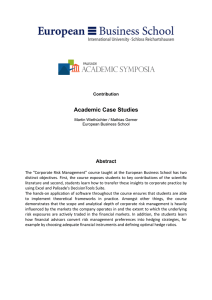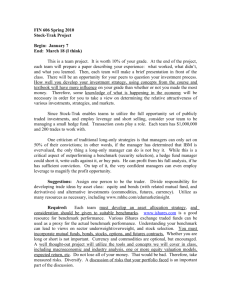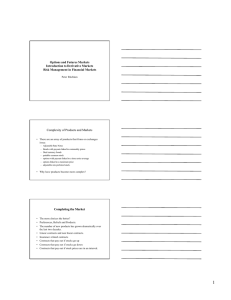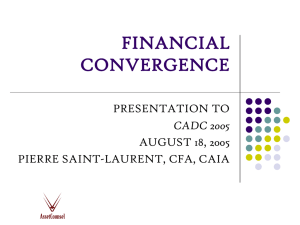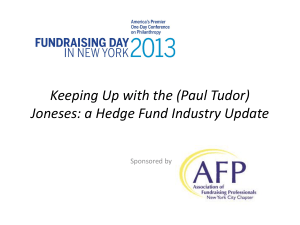- AllAboutAlpha: Hedge Fund Trends & Alternative Investment Analysis - - 3/3/2011
advertisement
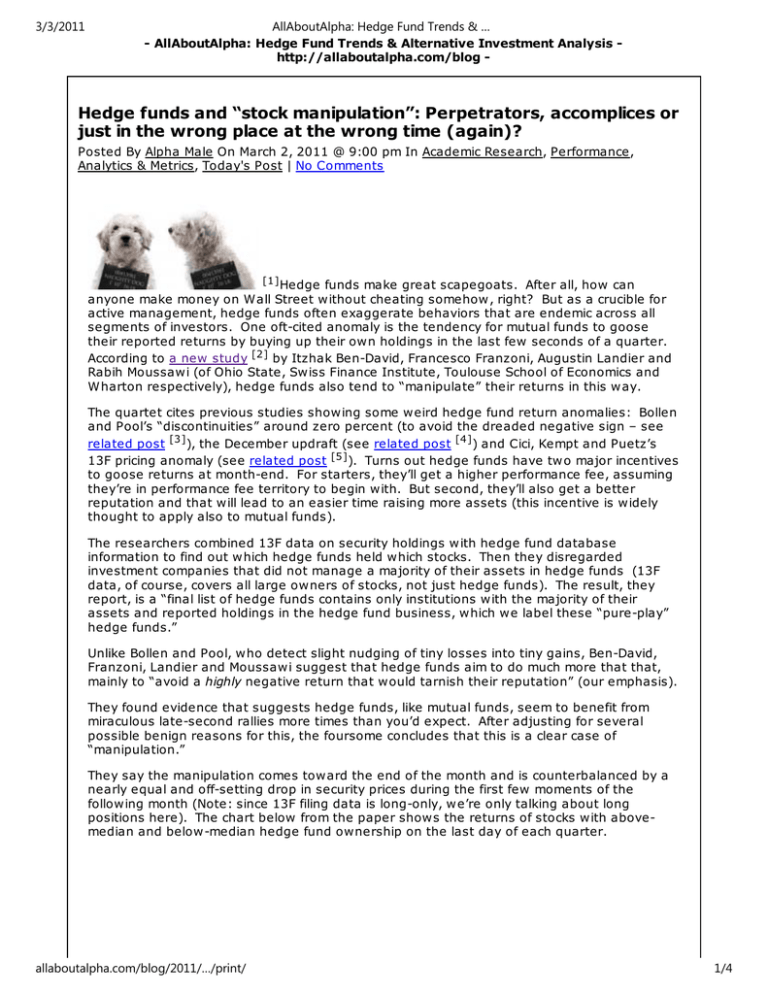
3/3/2011 AllAboutAlpha: Hedge Fund Trends & … - AllAboutAlpha: Hedge Fund Trends & Alternative Investment Analysis http://allaboutalpha.com/blog - Hedge funds and “stock manipulation”: Perpetrators, accomplices or just in the wrong place at the wrong time (again)? Posted By Alpha Male On March 2, 2011 @ 9:00 pm In Academic Research, Performance, Analytics & Metrics, Today's Post | No Comments [1] Hedge funds make great scapegoats. After all, how can anyone make money on Wall Street w ithout cheating somehow , right? But as a crucible for active management, hedge funds often exaggerate behaviors that are endemic across all segments of investors. One oft-cited anomaly is the tendency for mutual funds to goose their reported returns by buying up their ow n holdings in the last few seconds of a quarter. According to a new study [2] by Itzhak Ben-David, Francesco Franzoni, Augustin Landier and Rabih Moussawi (of Ohio State, Swiss Finance Institute, Toulouse School of Economics and Wharton respectively), hedge funds also tend to “manipulate” their returns in this w ay. The quartet cites previous studies showing some w eird hedge fund return anomalies: Bollen and Pool’s “discontinuities” around zero percent (to avoid the dreaded negative sign – see related post [3] ), the December updraft (see related post [4] ) and Cici, Kempt and Puetz’s 13F pricing anomaly (see related post [5] ). Turns out hedge funds have tw o major incentives to goose returns at month-end. For starters, they’ll get a higher performance fee, assuming they’re in performance fee territory to begin w ith. But second, they’ll also get a better reputation and that w ill lead to an easier time raising more assets (this incentive is widely thought to apply also to mutual funds). The researchers combined 13F data on security holdings w ith hedge fund database information to find out w hich hedge funds held w hich stocks. Then they disregarded investment companies that did not manage a majority of their assets in hedge funds (13F data, of course, covers all large ow ners of stocks, not just hedge funds). The result, they report, is a “final list of hedge funds contains only institutions with the majority of their assets and reported holdings in the hedge fund business, which we label these “pure-play” hedge funds.” Unlike Bollen and Pool, w ho detect slight nudging of tiny losses into tiny gains, Ben-David, Franzoni, Landier and Moussaw i suggest that hedge funds aim to do much more that that, mainly to “avoid a highly negative return that w ould tarnish their reputation” (our emphasis). They found evidence that suggests hedge funds, like mutual funds, seem to benefit from miraculous late-second rallies more times than you’d expect. After adjusting for several possible benign reasons for this, the foursome concludes that this is a clear case of “manipulation.” They say the manipulation comes toward the end of the month and is counterbalanced by a nearly equal and off-setting drop in security prices during the first few moments of the following month (Note: since 13F filing data is long-only, w e’re only talking about long positions here). The chart below from the paper show s the returns of stocks w ith abovemedian and below-median hedge fund ownership on the last day of each quarter. allaboutalpha.com/blog/2011/…/print/ 1/4 3/3/2011 AllAboutAlpha: Hedge Fund Trends & … [6] As you can see, stocks w ith a high proportion of hedge fund ownership tend to have a slightly higher return on the last day of the quarter. This suggested to the authors that hedge funds w ere buying their own stocks to inflate returns. This theory gets credence from the fact that stocks w ith high hedge fund ow nership also tended to exhibit low er returns on the first day of the month, suggesting to the authors that hedge fund managers quickly unload their ow n names after their artificially high return are logged. [7] Again, you’ll notice that this phenomenon of high month-end returns and low month-start returns occurs even w ith “low hedge fund ownership” stocks. This raises the question: to w hat extent is this phenomenon unique to hedge funds? Ben-David, Franzoni, Landier and Moussawi also found that less liquid stocks were more prone to experience late inning rallies and commensurate early inning losses as a result of “manipulation.” This makes sense since it w ould be a lot easier to influence the price of an illiquid stock than a highly liquid one. The chart below, supplied by the authors, show s the allaboutalpha.com/blog/2011/…/print/ 2/4 3/3/2011 AllAboutAlpha: Hedge Fund Trends & … theoretical amount of capital required to inflate a stock price 1% in the final 10 seconds of trading. Each line represents a different liquidity decile in accordance w ith a liquidity metric invented by Yakov Amihud of NYU. [8] The researchers also found that this “manipulation” is more likely to occur in stocks ow ned by hedge funds w ith less diversified portfolios. After all, it’s those funds that stand to gain the most by artificially inflating prices, since the stock in question has a larger impact on the fund’s overall performance. They also find that stocks ow ned by hedge funds having a stellar year are more likely to be “manipulated” than stocks ow ned by poorly performing hedge funds. The logic is a bit more muddled here though. The authors suggest the incentives to manipulate are higher when funds are “competing for the highest positions on the list.” Yet they also argue that manipulation is beneficial for hedge funds “…because is allow s them to avoid a highly negative return…”. New and smaller funds are fingered in the report since they have a higher “performanceflow ” relationship. (See this post [3] for more on the propensity for new and small funds to avoid tiny losses and apparently to turn them into tiny gains). The evidence presented in this paper suggests that hedge fund ow nership is one of several factors that predict whether a stock tends to rise on the last day and fall on the first day of a month or quarter. Rather than presenting this as a smoking gun that would indict hedge funds, the authors are more circumspect: “[H]edge funds seem to add another layer of manipulation independent of what has already been found for mutual funds.” In general, hedge funds can’t be described as conservative w allflow ers w ith highly diversified portfolios that don’t pounce on opportunity. As a result, one might expect them to buy more actively traded stocks w ith a live investment thesis. Such stocks might attract a number of other types of similarly-minded investors from small long-only boutiques to day traders. Thus, the demographic of their co-investors might also influence the price behavior of these stocks; note that the authors say the media hedge fund holding w as only 1.3% of each company’s outstanding stock. After reading this paper we w ondered whether hedge funds w ere the perpetrators of price “manipulation,” accomplices to the act or merely had the bad luck to – once again – be at the scene of the crime. Article printed from AllAboutAlpha: Hedge Fund Trends & Alternative Investment Analysis: allaboutalpha.com/blog/2011/…/print/ 3/4 3/3/2011 AllAboutAlpha: Hedge Fund Trends & … http://allaboutalpha.com/blog URL to article: http://allaboutalpha.com/blog/2011/03/02/hedge-funds-and-stockmanipulation-perpetrators-accomplices-or-just-in-the-wrong-place-at-the-wrong-timeagain/ URLs in this post: [1] Image: http://allaboutalpha.com/blog/wpcontent/uploads/2011/02/iStock_000002908163XSmall.jpg [2] a new study: http://papers.ssrn.com/sol3/papers.cfm?abstract_id=1763225 [3] related post: http://allaboutalpha.com/blog/2010/09/15/when-hedge-fund-managersreally-hate-tiny-losses/ [4] related post: http://allaboutalpha.com/blog/2010/08/15/research-shows-that-hedgefund-investors-may-want-to-join-others-by-selling-in-may-and-going-away/ [5] related post: http://allaboutalpha.com/blog/2010/09/12/academic-study-examineswhy-some-hedge-funds-appear-to-be-fudging-valuations/ [6] Image: http://allaboutalpha.com/blog/wp-content/uploads/2011/02/HFreturns_1.gif [7] Image: http://allaboutalpha.com/blog/wp-content/uploads/2011/02/HFreturns_2a.gif [8] Image: http://allaboutalpha.com/blog/wp-content/uploads/2011/02/HFreturns_3.gif Copyright © 2008 blog. All rights reserved. allaboutalpha.com/blog/2011/…/print/ 4/4
